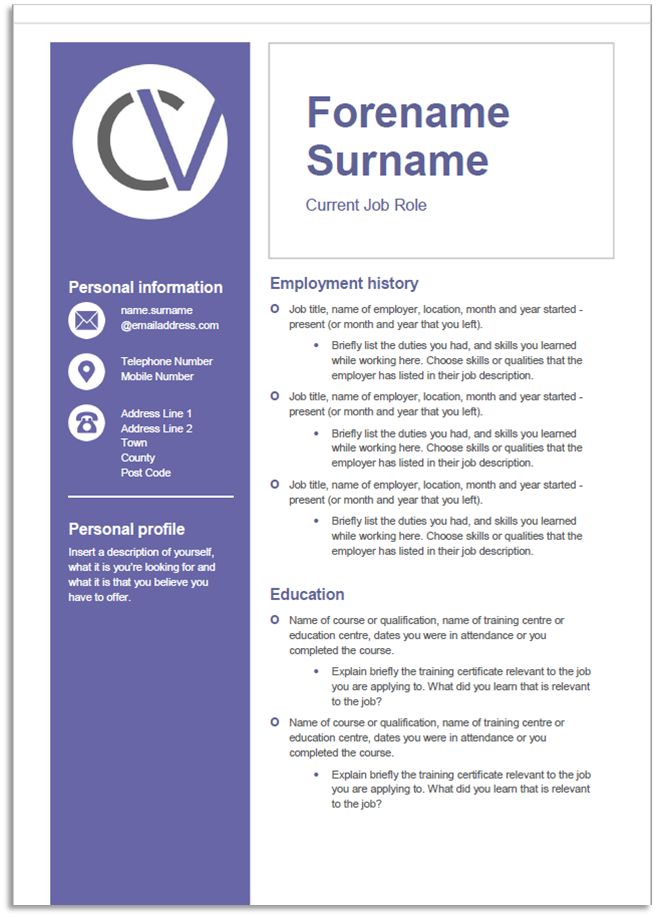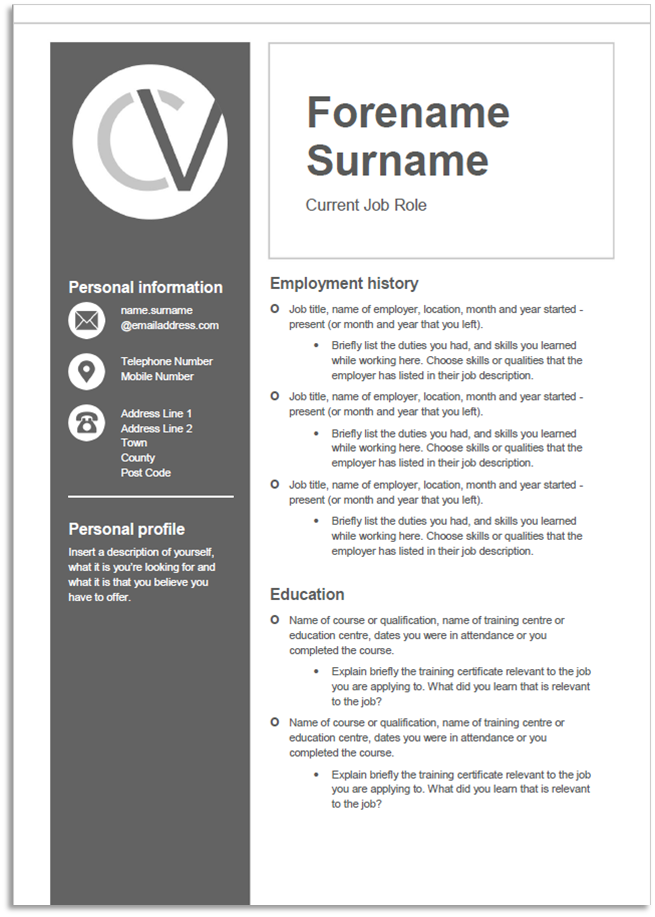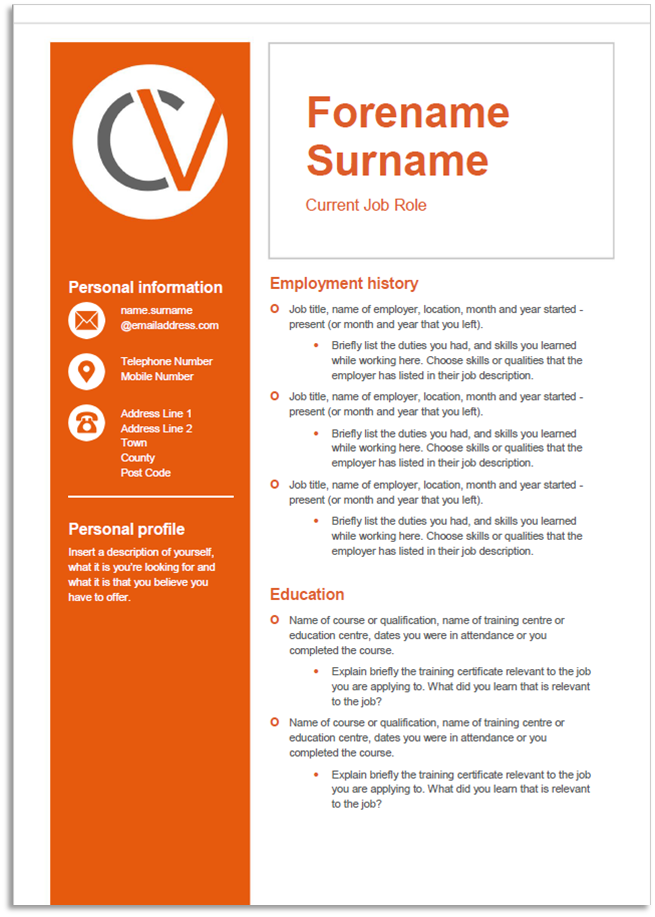A personal assistants (or PA) primary responsibility is usually to assist one or more people with their work-related tasks and activities.
To land a job as a PA, your CV will need to show that you are organised, able to work under pressure and have excellent communication and computer skills.
Whether you're looking to start your career as a PA or looking for a new challenge within the admin and secretarial sector, our free CV template is tailored to ensure your CV stands out from the crowd.
A guide to writing a CV for a job as a Personal Assistant
Name: Chelsea Butler
Tel No: 0000 0000 00
Email: ChelseaButler@email.com
Address: 80 Shire Oak Road
London
SE45 7SF
Personal Profile
In the personal profile, you should professionally introduce yourself, in three or four sentences, with relation to the job you’re applying to.
Try to include: your current work situation, what type of work you are searching for (such as part-time, flexible hours, or full-time employment starting immediately) some key skills and/or traits that will show the potential employer that you are a good candidate for the advertised job. For example if you have experience as a personal assistant and have any qualifications in administration, mention this here.
EXAMPLE:
I am a highly organised individual with good literacy and computer skills, and have two years’ experience working as a personal assistant in the finance sector. I have a professional manner and I’m able to efficiently prioritise the most important tasks and my time. I am looking for a challenging full-time role that will continue to improve my skills.
Work History
Use the work history section to highlight the skills and experience your current and previous jobs have given you, relevant to the role you're apply for. The aim is to show potential employers why you are a good fit for the job. You don’t need to include every last detail about your previous jobs, just pick the best and most relavant parts. You can always write down and save your examples or other relevant skills for the interview.
- Job title, name of employer, location, month and year started – present (or month and year that you left)
- Briefly list the duties you had, and skills you learned while working here. Choose skills or qualities that the employer has listed in their job description.
EXAMPLE:
- Executive assistant, EY, London, October 2016 – present
- Supporting four partners in the business support services, I am responsible for managing their diaries and meetings, travel arrangements, maintaining relationships with clients and their PAs, as well as internal members of the company
- I have also learned how to manage their communication channels, budgets, events and expenses, in line with company procedures
What jobs should you include?
- Try to include your work history for the last five years. If you haven’t been working for that long, that is okay. It will be explained by the education history. If you have recently moved to the country, it’s okay to include employment in other countries.
- Any jobs you’ve had in the administrative and secretarial sector will be useful to include here as lots of the skills will overlap and show you’re a good candidate for the role.
- If you have recently left education, or are new to this type of work, try to include any jobs you’ve had that will highlight the skills the employer is looking for. For example, if you have worked on the reception desk in a school or done any work experience that involved the use of computer systems, data entry or filing, use this to show that you have developed a good telephone manner, paperwork organisation and the ability to prioritise your workload.
Education History
In education history, this is a chance to show any relevant training you have completed, what skills you have learned from your courses, as well as general education subjects you’ve passed. As you get more work experience, this section will become shorter, as your work history becomes more relevant and more recent.
Literacy and numeracy skills up to at least GCSE-level are normally required to be a Personal Assistant. Knowledge of Microsoft Office and other computer skills will be highly useful, so any extra training qualifications you have make sure you list them here.
- Name of course or qualification, name of training centre or education centre, dates you were in attendance or you completed the course
- Explain briefly the training certificate relevant to the job you are applying to. What did you learn that is relevant to the job?
EXAMPLE:
- Microsoft Office Plus Diploma, Pittman Training, Holborn, August 2016
- Covered the key areas of MS packages including word, outlook, excel, powerpoint and access, as well as two elective courses in excel expert and effective business communication
If you have completed courses or gained certificates in other work-related areas, or first aid, include that information here.
Skills
Here is your chance to highlight the best skills you have in relation to the job you’re applying for. Hint: these will be the skills listed in the job advert, but only highlight the skills you have. Misleading information on your CV is likely to trip you up in an interview and is unprofessional; you don’t have to show you have every last skill listed in the job advert to be successful.
EXAMPLE:
- Communication skills – ‘In my current role I have been focusing on improving my communications skills. This has included the ability to listen and carry out instructions carefully.'
- Research and writing reports – ‘Over the last few months in my current role, my tasks have included writing internal research and collating data to be used in presentations. This has expanded my skill set and knowledge’.
References
First and last name
Job title and relation to you in the work place (if it isn’t obvious from the job title), name of work place, work contact number (or main company phone number which they can be reached through) and work email address
EXAMPLE:
Megan Hobbs
Supervisor at EY, London
0000 0000 00
MeganHobbs@email.com
Who should you include as a reference?
- Your first reference should ideally be from a senior colleague or manager who you’ve been working closely with in your most recent role. The second reference can be from a current colleague, or line manager or supervisor from a previous job. It’s best practice to ask someone if they will be a reference for you before they are contacted. Be aware that not all employers actually contact references, but it’s important to have them available if needed
- It’s important to remember that while you are in your current job, consider that you may not want your reference (eg. your current boss) to be contacted until you have had an interview for a new possible job, or are actually offered it. This is because, for instance, if you weren’t offered the new job, and end up staying in your current job then you might not want your manager having been contacted as a reference. It can cause tension or awkward conversations about why you were trying to leave. A good way to get around this is to simply write ‘References available on request’. This shows the new employer that they can ask you for them as needed, but also means you can ask them to only contact them if you are offered the job, and then have time to ask the reference if it’s okay for them to be contacted. Most potential employers will be happy to wait to do this after offering you the job
- If you have only had one previous job, or have been studying, it is okay to include a tutor as a reference, or someone else as a character reference (who is not related to you)











